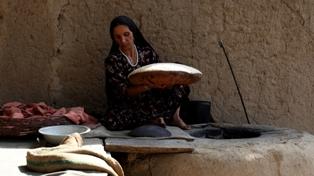KABUL - The 16 Days of Activism against Gender Violence is an international campaign that runs from 25 November, International Day of Elimination of Violence against Women, through 10 December, International Human Rights Day.
This year’s theme is “From Peace in the Home to Peace in the World” highlighting the key roles women play in the family and as peacemakers and peacekeepers in war zones. In Afghanistan, support for women’s issues is one of the five priorities of the United Nations agencies and programmes.
Sakeena, a single mother of three in Paktya, sells eggs to pay the costs of travel to a tailoring training centre. She is one of nearly 140 women enrolled. Upon completion, she will receive a sewing machine, iron and scissors allowing her to start a business in her family home.
“I am so happy to have this golden opportunity to learn a skill. The main purpose of the course is to provide tailoring skills to help women become self-sufficient,” she said.
In the past decade, more women learned new skills, entered the workforce and inspired their communities to become more self-reliant. About 43 per cent of women in Afghanistan work, according to the UN International Labour Organization (ILO).
Often, women’s first steps into the work force begin with learning read and write. Under the guidance of the Government’s National Literacy Strategy, United Nations agencies and programmes reached more than one million youth and adults in nearly all provinces. About 60 per cent of the participants are women.
The literacy programmes include a community banking element. Women in more than 6,500 Self Help Learning Groups in 20 provinces collected nearly Afs 27million, about USD 600,000, which is reinvested back into the communities.
To help women attending literacy programmes and vocational training, WFP provides food rations. More than 120,000 trainees - mostly women - who learned trades last year such as beekeeping, weaving and carpentry received food rations to feed an additional 600,000 relatives.
Increasingly, women – such as Sakeena - are also creating businesses. A backyard poultry project overseen by the Government and implemented by the Food Agricultural Organization (FAO) created 13,000 small scale poultry farms in eight provinces. Similarly, about 1,500 families in rural areas are taking part in a dairy project.
Women are also working as day labourers. In one community in Herat, women are hired to separate saffron robes from flowers. Saffron is increasingly being used as a legal alternative to opium.
An elderly woman said that during the winter, saffron processing helps her buy bread for the family, “This is a very good job. It keeps the women busy and puts more to work. Those who cultivate ask neighbours to share work and receive home pay.”
Educated women and healthy families are the foundation of a peaceful and progressive Afghanistan.






